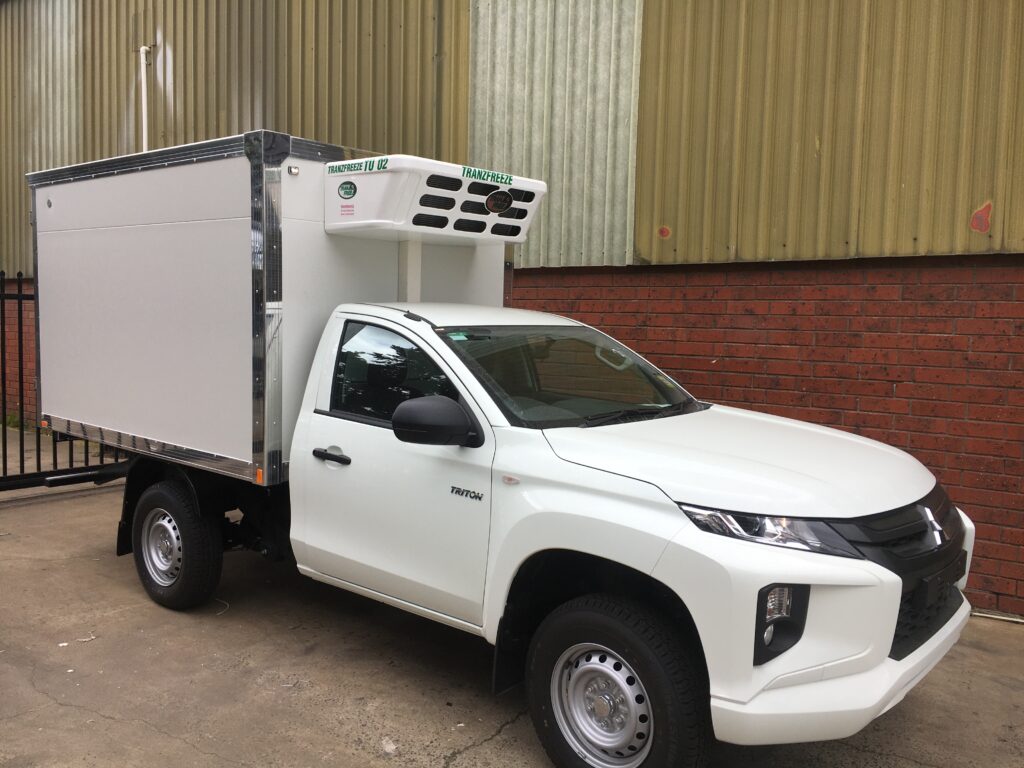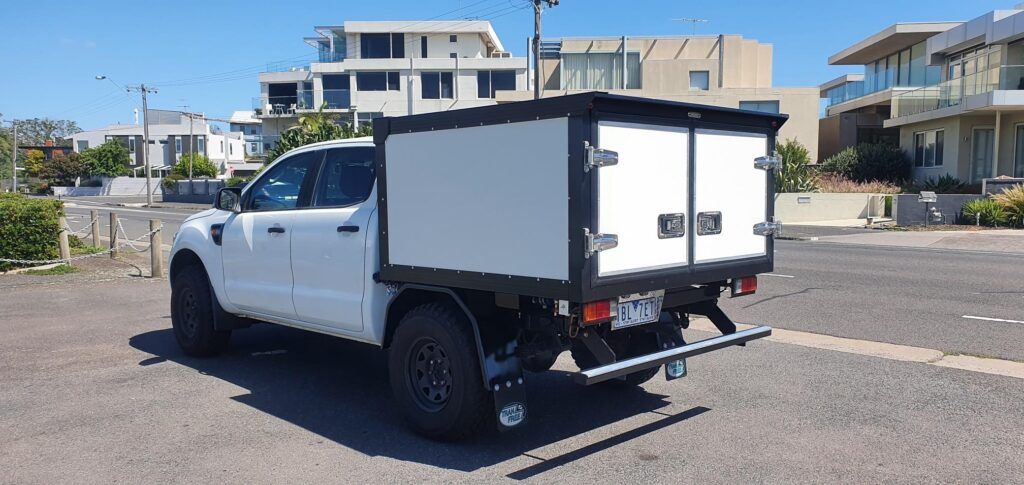What Are the Different Types of Refrigerated Trucks and Vans?
When it comes to transporting perishable goods, effective temperature control is a non-negotiable.
Refrigerated transportation is designed to keep goods at a consistent temperature throughout the transportation process to prevent spoilage or contamination.
There are a number of different types of refrigerated transport vehicles that can ensure your food, drinks or other perishable items stay safely preserved until they reach their destination.
But what are refrigerated vehicles, and why are refrigerated vehicles so important? Here’s why:
What Is a Refrigerated Vehicle?
A refrigerated vehicle, also known as a reefer van or truck, is an insulated transportation unit designed to keep items at a constant temperature.
Almost every refrigeration unit is equipped with cooling technology like a refrigeration system, thermoelectric cooling or evaporative cooling. This helps maintain the temperature inside the vehicle and keeps items cold throughout the transportation process.
Why Are Refrigerated Vehicles Important?

Refrigerated vehicles, encompassing everything from small vans to large refrigerated trailers, have the following benefits:
1) Supply Chain Logistics: Provide a critical service in the supply chain, particularly in the food and pharmaceutical industries. They offer a controlled environment for refrigerated shipping, ensuring items are kept at the necessary temperatures to maintain quality, freshness, and safety.
2) Prevent Spoilage: These vehicles prevent spoilage of perishable goods, reducing waste and sustaining the reputation of businesses. Refrigerated vans can transport frozen foods and other forms of refrigerated freight effectively and are ideal for this purpose.
3) Medical Supplies: Refrigerated vehicles play a crucial role in the delivery of medical supplies and pharmaceuticals, where maintaining a specific temperature range is often vital for these items to remain effective.
In essence, refrigerated vehicles are the backbone of climate-controlled transportation, enabling businesses to deliver their products safely to customers, no matter where they are located.
They are an indispensable asset in a world where goods are sourced globally, and customers expect fresh, high-quality products.
Different Types of Refrigerated Vehicles
Now, let’s take a look at the different types of refrigerated trucks and vans available on the market today:
1) Insulation Vans
Essentially, insulation vans are standard vehicles that have been retrofitted with an insulated interior. This insulation works to slow down the process of heat transfer, keeping the inside of the van cooler for longer periods of time.
While a typical insulation van does not have a built-in refrigeration unit, ice or cold packs can be used in conjunction to maintain low temperatures for a certain period.
These vans are equipped with 50-millimeter Styrofoam or polystyrene insulation. This polystyrene insulation prevents heat from transferring from the outside to the inside.
Ideal for short trips, the insulation vans are a cost-effective and energy-efficient option for the transportation of less perishable items.
2) Chiller Conversion Vans
Chiller conversion vans, often simply referred to as “chiller vans”, play a vital role in maintaining the freshness of perishable products that do not require below-zero storage temperatures during transportation.
These specialised vehicles are just like insulator vans, but they have a refrigeration component attached, which brings in cool air and ensures that non-frozen perishable goods such as flowers and beverages maintain their integrity during transport by providing a cool environment.
The use of chiller vans is essential in supply chains where it is important to keep items cool without necessarily keeping them frozen.
3) Semi-Freezer Vans
Semi-freezer vans stand out in the realm of cold chain logistics, offering a more advanced insulation system and a higher refrigeration capacity than chiller and insulation vans.
These specialised vans are designed to maintain a consistent low temperature, which can be adjusted as per the requirement of the transported goods.
An essential feature that sets semi-freezer vans apart is quick defrosting mechanisms which allows them to function optimally even without a defrost heater – a mechanism that prevents the accumulation of frost, thus ensuring the efficiency of the refrigeration unit and safeguarding the quality of temperature-sensitive goods.
In essence, the semi-freezer van underscores the evolution of cold supply chain solutions, combining advanced technology with robust performance.
4) Full-Freezer Vans
Full-freezer vans represent the pinnacle of refrigerated transport. They are equipped with the most significant freezing capabilities, enabling precise control over the internal environment’s exact temperature. This makes them ideal for shipping freight that requires to be kept at freezing temperatures throughout transit.
These vehicles have thicker and more heat-resistant doors, which reduces how much the cargo area of the van gets heated by the sun’s rays as a result of the metal exterior.
Utilised widely in the transportation of fresh food items like meat, seafood, and dairy products, they are indispensable in maintaining the integrity of these highly perishable items. The full-freezer van ensures that such goods can be delivered fresh to consumers, thereby meeting the rigorous standards of food safety.
Do All Refrigerated Vehicles Share the Same Characteristics?

While it might seem like all refrigerated vehicles share the same characteristics, the truth is, there are distinct differences depending on the specifics of the goods being transported.
For example, some vehicles that require refrigeration often have advanced quick defrost measures in place to ensure the right temperature is maintained consistently e.g. full-freezer vans. However, not all have this feature. This is particularly important as potential heat fluctuations during the journey can risk spoiling the cargo.
In essence, the demand for maintaining the right temperature and managing potential heat influences the specifications and requirements of these vehicles.
Therefore, whilst all vehicles used for transporting goods may have some common features, the degree of refrigeration and the type of goods being transported can significantly impact the overall design and functionality of the vehicle.
Factors to Consider in Choosing a Refrigerated Vehicle
For effective supply chain operations, especially for perishable items, refrigerated vehicles, need to be kept at cool temperatures. Many companies equip train cars, trucks, and ships with refrigeration units to ensure their goods are safely transported.
There are several types of refrigeration solutions that you can choose from. But what type of vehicle should you choose for your needs?
Choosing the right type of refrigerated vehicle for your business can be a bit daunting. But here are some essential factors to consider when selecting one:
1) The Load Size
You need to take stock of what you’re transporting in order to select the best truck to fit your needs. Consider the size of your load and how much space you need for it, then determine which type of truck best suits your needs.
2) Temperature Requirements
It’s important to consider the temperature requirements of the goods you are transporting. Chiller vans are ideal for carrying perishable items that require cool temperatures between 0-5 degrees Celsius, while full-freezer vans are ideal for goods that need to be transported at sub-zero temperatures between -18 to 0 degrees Celsius.
3) Location of Delivery
Another factor to consider when selecting a refrigerated vehicle is the location of delivery. If you’re transporting goods across long distances or over a large area, it might be more cost-effective to choose an insulated van or a semi-freezer van, which have thicker insulation and better refrigeration control.
4) Budget
The budget is also a major factor when selecting a refrigerated vehicle. Different types of trucks may have different budgets depending on the model and features included. However, investing in a quality refrigerated vehicle is essential to ensure that you can deliver your goods safely and on time.
Tips for Maximising the Use of Your Refrigerated Truck
Once you’ve chosen the right type of refrigerated vehicle for your needs, there are several tips to keep in mind that can help you optimise its use.
- Check the temperature of your truck regularly. This is critical to ensure that your goods remain at a safe temperature throughout the journey. You should also make sure that the temperature controls of your truck are working properly and that you have a backup plan in case of any issues.
- Regularly inspect and service your refrigerated vehicle to ensure it is running optimally. This should include checking all the components, such as switches, motors, fans, and pumps to make sure everything is functioning correctly.
- Use insulated curtains or covers to reduce heat and light from entering the vehicle, and also use reflective materials like aluminium foil to reflect back any heat that enters.
- When loading your refrigerated truck, consider the type of goods you’re carrying so that you can place them in an orderly fashion. This will help keep your goods well organised during transit and ensure optimal temperature control.
- Utilise the right packaging materials when shipping your goods, such as insulated boxes and containers. This can minimise any potential damage during transit and ensure that your goods stay at the required temperature.
Selecting the right type of refrigerated vehicle for your needs is essential for safe and successful transportation of perishable items. However, it’s just as important to consider other factors such as temperature control, budget, and proper loading techniques.
How TranzFreeze Can Assist You
TranzFreeze is an industry-leading supplier of transport refrigeration equipment and has been providing quality solutions to businesses for over 30 years.
We offer a wide range of refrigerated trucks, including vans, trucks, utes, and other options to ensure that you get the right vehicle for your needs.
We also provide installation services and maintenance for our products to ensure that your vehicles are always running smoothly.
If you’re looking for reliable transport refrigeration solutions, look no further than TranzFreeze.
Conclusion
When it comes to transporting perishable goods, having the right type of refrigerated vehicle can make all the difference. Choosing the right truck and following essential tips for optimising its use is critical for successful and safe transport.
At TranzFreeze, we understand your needs and have prepared a range of reliable solutions to meet them. Contact us today to learn how we can help with your refrigerated transportation needs.
Types of Refrigerated Vans – FAQs
What are refrigerated trucks called?
Refrigerated trucks are also known as reefers, chill vans, and refrigerated vehicles.
How do you transport food safely?
When transporting food items, it is important to ensure the goods are kept at a safe temperature throughout their journey. This can be done by using a refrigerated vehicle such as a van or truck with temperature control features.
What are the different types of cooling vans?
There are several types of cooling vans that are available, including chiller vans, which can keep items between 0-5 degrees Celsius; full freezer vans, which can keep items at sub-zero temperatures (-18 to 0 degrees Celsius); and insulated or semi-freezer vans with thicker insulation.
What are freezer trucks called?
Freezer trucks are also known as full-freezer vans, reefers, and refrigerated vehicles.
How do I keep my truck cold?
You can keep your truck cold by using insulated curtains or covers to reduce the amount of heat and light entering the vehicle, as well as reflective materials like aluminium foil to reflect back any heat that enters.
What is the difference between a reefer truck and a reefer container?
A reefer truck is a type of refrigerated vehicle that is used to transport goods, while a reefer container is a type of insulated container with cooling and temperature control features. Reefer containers can also be transported by trucks.
What is a freezer van?
A freezer van is a type of refrigerated vehicle specifically designed to transport goods at sub-zero temperatures between -18 to 0 degrees Celsius. This type of vehicle is ideal for transporting frozen food items such


